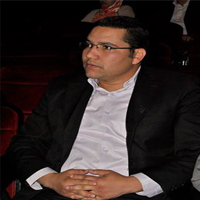"الصحافة في العالم العربي مرتبطة بالأدب.. كانت قصائد شوقي تنشر في الصفحة الأولى بجريدة الأهرام.. الآن تغيّر الوضع وأصبحت الجرائد للسياسة وتطرد الأدب إلى صفحات الملاحق" عارف حجاوي |
يشكل تنظيم وزارة الثقافة بالمغرب للمعرض الدولي للكتاب السنوي بالدار البيضاء شهر فبراير/شباط، حدثا ثقافيا تتناوله المنابر الإعلامية المغربية بكل أنواعها. وهي فرصة من بين أخرى قليلة، تصير فيه الثقافة حدثا يفرض نفسه وطنيا، من خلال التعريف بالإصدارات الجديدة والكتاب والشعراء، ومتنفس يطل من خلاله المبدعون المغاربة على قرائهم ويعرضون فيه أعمالهم التي لا تلقى الاهتمام المستحق إلا في مناسبات خاصة.. فما مكانة الثقافة في الإعلام المغربي؟ وكيف يراها المثقفون في الصحافة؟
يظل حضور الثقافة في برامج تابعة للإعلام المرئي متواضعا منذ سنوات، ونتحدث هنا بالخصوص عن القناتين الرسميتين الأولى والثانية لأنهما الأكثر مشاهدة والأقدم، رغم وجود قناة موضوعاتية هي الثقافية، إلا أنها لا تعرف نسبة مشاهدة كبيرة. ونجد في دفتر تحملات(مسؤوليات) القناتين الأولى والثانية لسنة 2012 أن من الأهداف العامة للخدمة العمومية، أي التلفزيون الرسمي المغربي، في المادة الثانية: "إشعاع الثقافة والحضارة المغربيتين ورفع تنافسية الإنتاج السمعي البصري"، غير أننا نكتشف برامج قليلة ذات بعد ثقافي، في الأولى هناك برنامج "مشارف" و"صدى الحروف" الأسبوعيين، وفي القناة الثانية نجد برنامج "الناقد" الأسبوعي و"كتاب قريتو" المادة الثقافية ذات الثلاث دقائق، مع كثرة برامج الفن والترفيه التي تجذب الكثير من نسب المشاهدة وبالتالي الإعلانات. فيما النشرات الإخبارية بالعربية والأمازيغية والفرنسية اليومية لا تضم بالضرورة خبرا ثقافيا وغالبا ما تكون التقارير الثقافية مواد لإنهاء النشرة وتوديع المشاهد.
الأمر نفسه في القنوات الإذاعية، فباستثناء الإذاعات الرسمية العمومية التي تضع برامج الثقافة في شبكاتها البرامجية، تقاوم الإذاعات الخاصة من أجل البقاء عبر البحث المستمر عن التمويل والإعلانات. لذا تلجأ لبرمجة الكثير من البرامج الترفيهية والخفيفة لاستمالة المستمعين وبالتالي تحقيق نسب استماع مهمة لضمان الإعلانات من طرف الشركات والمؤسسات.
وكمثال على البرامج الإذاعية الثقافية، برنامج "حبر وقلم" وهو برنامج أدبي ثقافي يحاول قراءة وتحليل النصوص الإبداعية والتعريف بها إعلاميا عبر أثير الإذاعة الوطنية.
اهتمام محتشم
إن الثقافة منتوج رمزي يعبر عن هوية البلد، فيما يرنو الإعلام حاليا بالمغرب نحو الاستهلاك عموما أمام المتطلبات اليومية التمويلية. فرغم ضعف القراءة في زمننا الحاضر، تتراجع الثقافة بدورها في الإعلام بحثا عن نسب المشاهدة، في حين أن الخدمة العمومية للتلفزيون تقتضي الإسهام في تنوير الرأي العام وأن يساهم الإعلام في الرقي بالمستوى المعرفي والثقافي. يقول الكاتب والفنان لحسن ملواني لمجلة الصحافة "الاهتمام الصحفي بالفعل والمنجز الثقافي بالمغرب لا يزال اهتماما محتشما؛ فالصفحات المخصصة له محدودة بغض الطرف عن المحتويات التي ترد فيها بين أخبار متفرقة تتعلق بإصدار أو ندوة أو ملتقى. والحال أن الفعل الثقافي كونه يصب في قلب قضايا المجتمع بالعمق الفكري والإبداعي أمر يستوجب الاهتمام من قبل الصحافة دعما لها ودعما لنشر الفعل الثقافي الذي بإمكانه تهذيب الأذواق وتجديد الرؤى والأفكار".
أما الصحفي المتخصص بالشأن الثقافي، فلا يكفي أن يكون مؤهلا على المستوى المهني "التقني" فقط، بل عليه أن يكون واعيا بالمنتوج الثقافي وخصائص الإبداع ومعرفة الجمهور ونفسيته، ليتمكن من التفاعل مع الواقع.. وثمة من يرى أن عليه امتلاك صفات الأديب والناقد والفنان والمثقف.
مقاومة الصحافة الثقافية
تقاوم الصحافة الثقافية بالمغرب الاحتضار حسب الكثير من آراء الفاعلين الثقافيين، لندرة الصحف والمجلات المتخصصة، والتراجع الحاد في الحضور الذي كانت تحظى به الملاحق الثقافية ببعض الجرائد، خاصة في عقدي الثمانينيات والتسعينيات. إضافة لتأثيرات ضعف المقروئية في المجتمع، وانتقال جزء رئيسي من الصحافة من أداة لتأطير الرأي العام إلى مقاولات تجارية تهتم بالمبيعات والإعلانات.
ومنذ ظهور أول ملحق ثقافي بالمغرب "العَلَم الثقافي" عام 1969، ثم ملاحق ثقافية في صحف أخرى مثل جريدة "الاتحاد الاشتراكي" ثم جريدة "المنعطف" وغيرهما، ابتدأت حقبة زمنية شكلت مدرسة مهمة في تاريخ الإعلام الثقافي المغربي، وقد أبرزت أسماء مهمة في عالم الأدب والنقد، وعرفت تنافسا بين المنابر لاستقطاب هذه الأسماء أو تلك وكذلك سجالات معرفية وفكرية. وحاليا تعتبر جريدة "أخبار اليوم المغربية" الوحيدة التي تنشر صفحة ثقافية بشكل يومي تتناول الإبداع الأدبي والثقافي ورموزه، ما يطرح تساؤلات حول الخطوط التحريرية للمنابر الصحفية ومدى اهتمامها بالمنجز الثقافي المغربي، علما أن طفرة كبيرة تعرفها الساحة الثقافية بالمغرب، سواء على مستوى الإصدارات في الفكر والشعر والقصة وغيرها، أو على مستوى الأنشطة ذات الصبغة الثقافية في كل مناطق المغرب شمالا وجنوبا.. يعلّق الكاتب والشاعر لحسن ملواني "الفعل الثقافي في الصحافة الورقية مهمش تهميشا يدل على انحصاره في ثلة من المهتمين، في الوقت الذي ننتظر أن يحمل إشعاعا ويثير نقاشا جادا بين شتى أطياف المجتمع. وبصفة عامة ينزوي بحيث لا يمكنه بسط فعله السحري ليساهم في التقدم والتحضر سلوكا ورؤى وإبداعا".







































